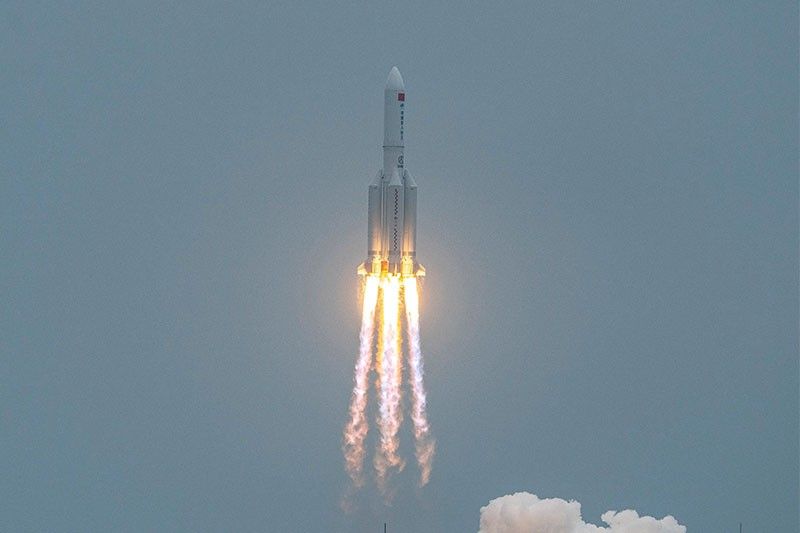Large Chinese rocket segment disintegrates over Indian Ocean

BEIJING, China — A large segment of a Chinese rocket re-entered the Earth's atmosphere and disintegrated over the Indian Ocean on Sunday, the Chinese space agency said, following fevered speculation over where the 18-tonne object would come down.
Officials in Beijing had said there was little risk from the freefalling segment of the Long March-5B rocket, which had launched the first module of China's new space station into Earth orbit on April 29.
But the US space agency NASA and some experts said China had behaved irresponsibly, as an uncontrolled re-entry of such a large object risked damage and casualties.
"After monitoring and analysis, at 10:24 (0224 GMT) on May 9, 2021, the last-stage wreckage of the Long March 5B Yao-2 launch vehicle has re-entered the atmosphere," the China Manned Space Engineering Office said in a statement, providing coordinates for a point in the Indian Ocean near the Maldives.
It added that most of the segment disintegrated and was destroyed during descent.
The US military's Space Command said the rocket "re-entered over the Arabian Peninsula at approximately 10:15 pm EDT on May 8 (0215 GMT Sunday)".
"It is unknown if the debris impacted land or water."
Monitoring service Space-Track, which uses US military data, said that the location in Saudi Arabia was where American systems last recorded it.
"Operators confirm that the rocket actually went into the Indian Ocean north of the Maldives," it tweeted.
The segment's descent matched expert predictions that any debris would have splashed down into the ocean, given that 70 percent of the planet is covered by water.
Because it was an uncontrolled descent, there was widespread public interest and speculation about where the debris would land.
American and European space authorities were among those tracking the rocket and trying to predict its re-entry.
Accusations of negligence
Objects generate immense amounts of heat and friction when they enter the atmosphere, which can cause them to burn up and disintegrate. But larger ones such as the Long March-5B may not be destroyed entirely.
Their wreckage can land on the surface of the planet and may cause damage and casualties, though that risk is low.
Last year, debris from another Chinese Long March rocket fell on villages in the Ivory Coast, causing structural damage but no injuries or deaths.
That, and the one that came down Sunday, are tied for the fourth-biggest objects in history to undergo an uncontrolled re-entry, according to data from Harvard-based astronomer Jonathan McDowell.
The uncertainty and risks of such a re-entry sparked accusations that Beijing had behaved irresponsibly.
US Defense Secretary Lloyd Austin suggested last week that China had been negligent, and NASA Administrator Bill Nelson echoed that after the re-entry on Sunday.
"Spacefaring nations must minimize the risks to people and property on Earth of re-entries of space objects and maximize transparency regarding those operations," Nelson said in a statement.
"It is clear that China is failing to meet responsible standards regarding their space debris."
China's space ambitions
To avoid such scenarios, some experts have recommended a redesign of the Long March-5B rocket — which is not equipped for a controlled descent.
"An ocean reentry was always statistically the most likely," McDowell tweeted.
"It appears China won its gamble (unless we get news of debris in the Maldives). But it was still reckless."
Chinese authorities had downplayed the risk, however.
"The probability of causing harm to aviation activities or (on people and activities) on the ground is extremely low," foreign ministry spokesman Wang Wenbin said Friday.
Beijing has poured billions of dollars into space exploration to boost its global stature and technological might.
The launch of the first module of its space station — by the Long March rocket that came down Sunday — was a milestone in its ambitious plan to establish a permanent human presence in space. — with Qasim Nauman in Seoul
Monitor major developments on space explorations and the status of missions.
NASA reveals a sample collected from the 4.5-billion-year-old asteroid Bennu contains abundant water and carbon, offering more evidence for the theory that life on Earth was seeded from outer space.
The discovery follows a seven-year-round-trip to the distant rock as part of the OSIRIS-REx mission, which dropped off its precious payload in the Utah desert last month for painstaking scientific analysis.
"This is the biggest carbon-rich asteroid sample ever returned to Earth," NASA administrator Bill Nelson says at a press event at the Johnson Space Center in Houston, where the first images of black dust and pebbles were revealed. — AFP
NASA is set to reveal on Wednesday the first images of the largest asteroid sample ever collected in space, something scientists hope will yield clues about the earliest days of our solar system and perhaps the origins of life itself.
The OSIRIS-REx mission collected rock and dust from the asteroid Bennu in 2020, and a capsule containing the precious cargo successfully returned to Earth a little over two weeks ago, landing in the Utah desert.
It is now being painstakingly analyzed in a specialized clean room at NASA's Johnson Space Center in Houston. — AFP
A Spanish company launches the country's first private rocket on Saturday in a step towards bringing Spain into the exclusive club of space-faring nations.
The launch of the small MIURA1 rocket took place at 02:19 am (0019 GMT) from a military base in the southern region of Andalusia, according to the company, PLD Space.
The company hailed the launch as "successful" and said it had achieved all its "technical objectives". — AFP
India's Sun-monitoring spacecraft has crossed a landmark point on its journey to escape "the sphere of Earth's influence", its space agency says, days after the disappointment of its Moon rover failing to awaken.
The Aditya-L1 mission, which started its four-month journey towards the centre of the solar system on September 2, carries instruments to observe the Sun's outermost layers.
"The spacecraft has escaped the sphere of Earth's influence," the Indian Space Research Organisation (ISRO) says in a statement. — AFP
Carbon dioxide detected on Jupiter's moon Europa comes from the vast ocean beneath its icy shell, research using James Webb Space Telescope data, potentially bolstering hopes the hidden water could harbour life.
Scientists are confident there is a huge ocean of saltwater kilometres below Europa's ice-covered surface, making the moon a prime candidate for hosting extra-terrestrial life in our Solar System.
But determining whether this concealed ocean has the right chemical elements to support life has been difficult. — AFP
- Latest
- Trending


































